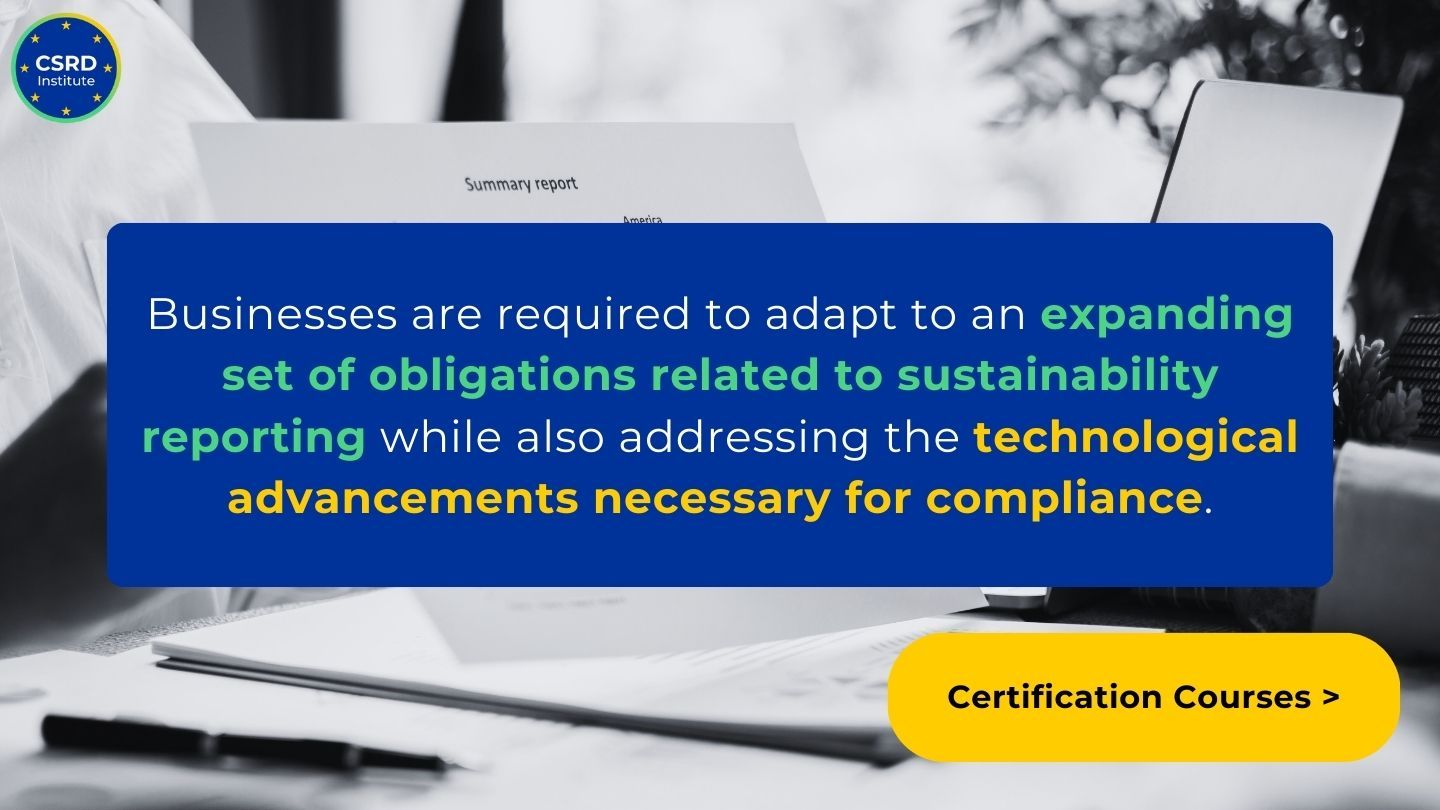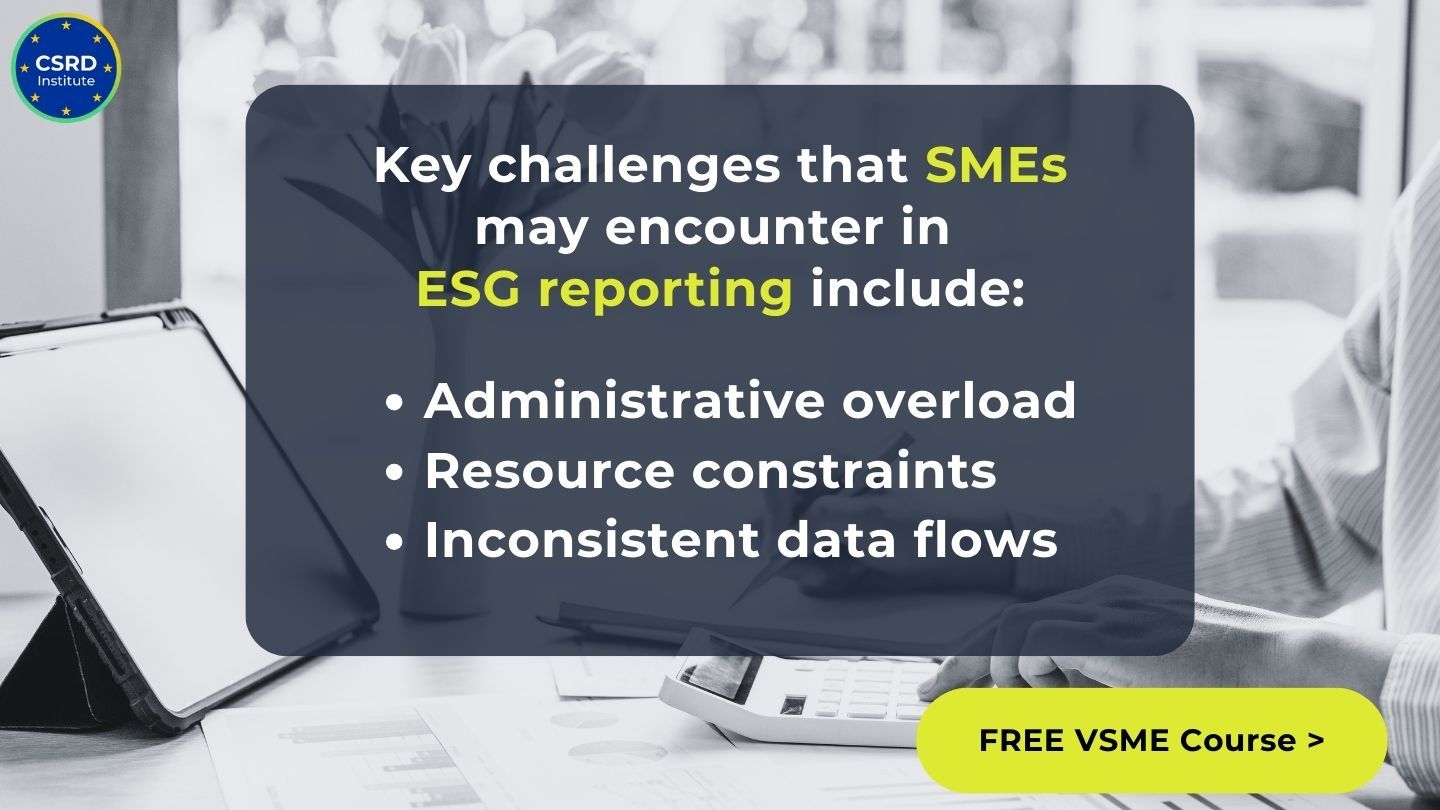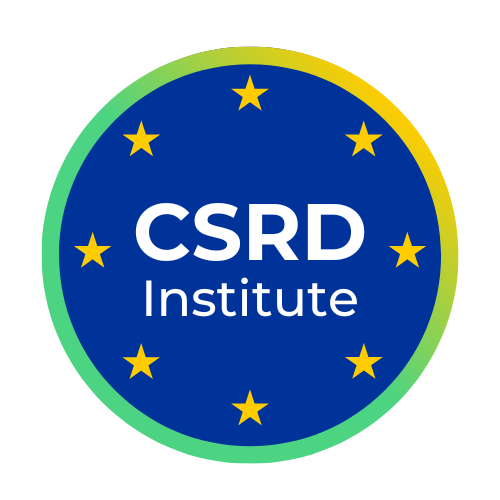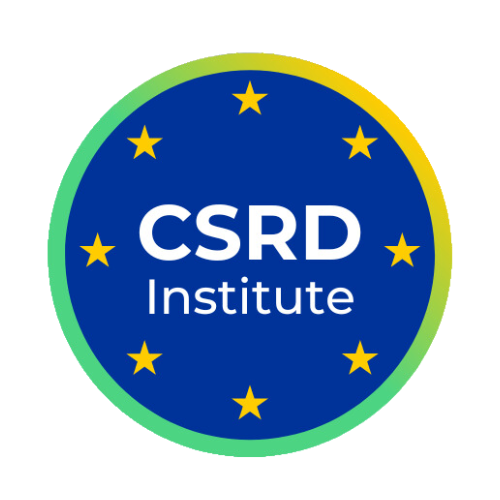Businesses in the new reporting landscape
Europe’s sustainability reporting landscape in 2025 is defined by regulatory ambiguity, as simplification efforts, political recalibration, and global pressures collide. While aiming to reduce burdens and boost competitiveness, these transitions risk diminishing the very transparency and accountability that ESG reporting is meant to uphold.
Businesses today are grappling with a range of complex challenges, including adapting to growing sustainability reporting obligations and keeping up with necessary technological advancements for compliance.
Businesses today are grappling with a range of complex challenges, including adapting to growing sustainability reporting obligations and keeping up with necessary technological advancements for compliance.

Additionally, companies must navigate the complexities of their supply chains, which can be further complicated by emerging simplification efforts.
Companies also find themselves juggling multiple ESG frameworks, such as the:
- Corporate Sustainability Reporting Directive (CSRD)
- Corporate Sustainability Due Diligence Directive (CSDDD)
- Taxonomy Regulation
- Sustainable Finance Disclosure Regulation (SFDR)
This scenario contributes to what has been described as regulatory “whiplash,” making strategic planning increasingly difficult for businesses operating in the current environment.
To better understand the implications of these developments, let’s take a closer look at the present situation in Europe’s sustainability reporting landscape.
Corporate Sustainability Reporting
What is the Corporate Sustainability Reporting Directive (CSRD)?
The Corporate Sustainability Reporting Directive (CSRD) is a sustainability reporting directive introduced by the European Union to enhance the scope and quality of sustainability reporting by corporations. The CSRD mandates the detailed disclosure of sustainability-related information by specific companies operating within the EU, aiming to provide stakeholders with a comprehensive view of a company's impact on society and the environment.
What is the Corporate Sustainability Due Diligence Directive (CSDDD)?
The Corporate Sustainability Due Diligence Directive (CSDDD) is an EU law mandating certain large companies to assess human rights and environmental impacts in their operations and value chains. Its goal is to foster sustainable and responsible corporate behaviour by ensuring companies identify, prevent, mitigate, and account for negative impacts.
EU Omnibus Proposal
The EU’s Corporate Sustainability Reporting Directive (CSRD) remains the central framework, expanding ESG reporting to tens of thousands of companies, but its implementation faces growing instability. Delays, transposition disparities, and political pushback have slowed the directive’s roll-out across member states.
In early 2025, the EU unveiled an Omnibus package targeting simplification of CSRD, CSDDD, the Taxonomy Regulation, and more. This includes extending deadlines by up to two years and raising thresholds so that only larger firms (over 1,000 employees or significant turnover) are required to comply.
While projected to save billions in compliance costs annually, critics argue these changes dilute transparency. The shift from mandatory to voluntary reporting, even under the voluntary SME standard (VSME), adds layers of ambiguity for value chain participants.
Geopolitical headwinds
Influential EU member states like France and Germany have lobbied for relaxed reporting obligations due to high compliance costs and competitive disadvantages. This has made EU-wide consensus more fragile and increased the likelihood of policy revisions. The EU's shift toward economic competitiveness and away from regulatory rigidity has further pushed for simplification, known as the "Competitiveness Compass."
Geopolitical tensions, particularly trade issues, add to the uncertainty, with rising tensions between the EU and US, and the EU and China, complicating sustainability efforts. Trade restrictions and retaliatory measures such as tariffs are leading some EU businesses to scale back ESG investments in favour of economic resilience.
So, how are companies managing the current uncertainty around sustainability reporting?
Large Organisations and Multinationals
Large companies in Wave 1 are committed to achieving compliance with the Corporate Sustainability Reporting Directive (CSRD) and have resolved any doubts about their inclusion in this regulatory framework. They hope that future data requirements will be simplified, recognising the challenges associated with detailed sustainability reporting while striving for transparency and accountability.
So, what strategies are large organisations and multinational companies implementing to effectively manage their reporting obligations while also mitigating potential risks associated with compliance and operational challenges?
So, what strategies are large organisations and multinational companies implementing to effectively manage their reporting obligations while also mitigating potential risks associated with compliance and operational challenges?
1. Building Cross-Functional Readiness
Companies like Dell and Mondelēz have embedded sustainability responsibilities across multiple departments rather than hiring standalone ESG teams. Multinationals often rely on executive involvement, integrating sustainability into board-level oversight and strategic planning, according to the PwC Global CSRD Survey 2024.
2. Tackling Double Materiality and Materiality Assessment
The dual requirement to report both the company’s impact on the environment and how ESG matters financially affect the business (“Double Materiality”) demands extensive stakeholder engagement and scoring of sustainability issues, often with external advisory support. Companies often start by over-including potential impacts and then narrow them down, a process that is time-consuming but essential for compliance.
3. Overcoming Practical and Technical Hurdles
Despite high confidence (63%) in CSRD readiness, companies still face key roadblocks: primarily data availability/quality (59%), complex value chains (57%), and staff capacity (50%), based on findings in the PwC Global CSRD Survey 2024.
Many large companies are investing in digital transformation, building centralised systems, automating data capture, and planning AI tools to streamline reporting objectives, as evidenced in this article from Deloitte/WSJ.
4. Strategic Framing of Sustainability Reporting
A majority of larger corporations (76%) see CSRD as a driver for deeper sustainability integration into strategic decision-making (PwC Global CSRD Survey 2024).
The Sustainability Reporting Navigator is a useful resource where you can download examples of CSRD-compliant sustainability reports across different industries, sectors, and countries.
SMEs and Value Chain Partners
The evolving sustainability reporting landscape is also affecting small and medium-sized enterprises (SMEs). Many SMEs are struggling to meet vague and demanding expectations from larger partners within their supply chains, and face pressure to align with the CSRD despite limited resources.
Some of the key challenges that SMEs may encounter in ESG reporting include:
Administrative overload
SMEs report being burdened by extensive data requests, for example, suppliers facing multiple audits or reports per client, each taking days to complete.
Resource constraints
SMEs often lack the financial capacity, staffing, and technical tools to manage sophisticated ESG reporting, especially around Scope 3 emissions and complex governance requirements.
Inconsistent data flows
Many SMEs struggle to obtain reliable data from tech partners such as cloud providers which is key for reporting emissions.
Without clear guidance, support, and digital tools, the risk is that ESG compliance becomes a barrier rather than an opportunity for growth.

How can SMEs capitalise on opportunities in ESG reporting?
VSME: A Voluntary, Simplified Reporting Option
The EU has recommended the VSME standard, a streamlined reporting framework for non-listed SMEs. It covers essential ESG topics and is intended to limit the amount of data that smaller firms are required to share with buyers affected by the CSRD regulations. This approach aims to balance the need for accountability with the realities faced by smaller businesses in managing their reporting obligations.
Collaboration and capacity-building
SMEs are encouraged to partner with large customers in order to gain a clearer understanding of their specific requirements. This collaboration will help SMEs strategically prioritise their data collection efforts, ensuring that they focus on the most relevant information needed by their partners.
Digital adoption and efficiency gains
Investing in digital tools, AI, and data systems is becoming increasingly essential for SMEs looking to improve their sustainability practices. These investments play a crucial role in streamlining the collection and reporting of sustainability data, which is vital for efficient operations and enhanced decision-making capabilities.
Staying ahead
It is crucial for businesses to remain well-informed and adaptable in the continually changing reporting landscape. This is especially important given the recent introduction of the EU Omnibus Proposal, as well as the potential updates to the CSRD.
Our CSRD certification courses deliver the latest insights on the CSRD aligned with current legislation and feature interactive notes on the proposed EU Omnibus changes, the “Stop-the-clock” directive, and the “Quick-Fix” Delegated Act for Wave One Companies.
Our VSME certification courses provide you with a solid understanding of the key concepts and principles behind the VSME standard. And this knowledge will prepare you to create a sustainability report that complies with the VSME standard, allowing you to leverage sustainability as a strategic business advantage.
We are committed to providing the most relevant and comprehensive education on every facet of the CSRD and the VSME standard and will continue to closely monitor developments to ensure our courses remain aligned with evolving standards and needs.
Explore our CSRD Certification Programme courses today to enhance your knowledge and be well-prepared to meet the regulatory requirements of the CSRD.
Not sure where to start? Register for one of our free courses here and start learning about the CSRD and the VSME standard today.

Copyright © 2025
